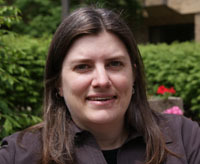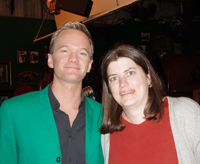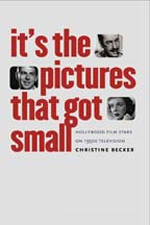 Christine Becker
Christine Becker
When Christine Becker signed up for Twitter in September 2009, the associate professor in Notre Dame’s Department of Film, Television, and Theatre wasn’t sure what to expect. What she found was a new way to connect with people in both academia and the television industry, a new source of research and teaching materials, and a vehicle for staying on the leading edge of her scholarly field.
It even led to an invitation to serve as the first online editor of Cinema Journal, a position that begins in January 2013.
“I didn’t even know [the journal’s incoming editor] knew me,” says Becker, who now runs three Twitter accounts and a popular blog, newsfortvmajors.com. “That’s the thing with social media—you don’t ever know who’s watching. Clearly he’d been following my blog, following me on Twitter, and I didn’t even know it. He recognized that I was playing a part in social media in my discipline, and so he offered this new position to me.”
Valuable Connections
 Christine Becker and Neil Patrick Harris, whom she follows on Twitter.
Christine Becker and Neil Patrick Harris, whom she follows on Twitter.
Becker says friends from her Ph.D. program at University of Wisconsin initially sparked her interest in Twitter, but connecting with other film and television scholars was just the beginning.
“I have to be careful not to assume more people are on Twitter than there really are, because the statistics say only something like 7 percent of people are on Twitter, but as far as my crowd, the very active TV fan crowd, a significant percentage of us are on Twitter.”
Social media, and Twitter in particular, Becker says, has become a key component of how a number of people experience TV—sharing thoughts and reactions to shows as they watch. “I think there is something about television—that sense of immediacy, that sense of live-ness, the communal kind of experience about TV that really encourages it.”
While fan reactions on Twitter can be “a gold mine for research,” Becker says, she also follows a number of writers, producers, editors, and directors who have joined the social media network. “It’s been an amazing window on the industry and those people are tweeting things we would have never known about behind-the-scenes production.”
And they are noticing her work, too. Already well known among television scholars, Becker’s blog was recently featured on Slate’s Culture Gabfest podcast and Hart Hanson, executive producer of the television show Bones, tweeted a link to her site.
“I follow him on Twitter and he tweeted something like, ‘hey look at this, this is really interesting,’” Becker says. “So I clicked the link—and it was my blog! It was absolutely stunning.”
Multiple Platforms
![]()
Becker tweets from a personal account @crsbecker, as well as two that are connected to her blog: @N4TVM (News For TV Majors) and @goodTVeets, which compiles the best, funniest, and most insightful tweets from the fans, scholars, and industry insiders she follows.
“It’s work and also it’s fun—I just really enjoy Twitter,” she says. “There’s a component of social interaction with it, building knowledge, keeping up with stuff … One of my favorite things to do is hang out on Twitter and talk with people.”
Launched in late 2009, the News For TV Majors blog is a product of Becker’s experiences on Twitter—a place to collect and share links to all the interesting articles she was finding through the social network.
Earlier that fall semester, Becker had begun sharing the links with students in her Television Narrative class in a private online space. “Then the class ended, and I realized I really liked doing this and the students really liked it,” she says. “So I thought, ‘OK, why not make a blog out of this?’
“There are tons of TV news sites out there but a lot of them, at least for academics, are either too much inside baseball—like this executive got hired here—or they are too celebrity-oriented and centered on gossip,” she says. “I wanted something that was basically academically oriented.”
Lively Discourse

While managing a blog and three active Twitter accounts isn’t easy, Becker says her social media work has been rewarding, both personally and professionally. For instance, she points to one of the scholars she follows on Twitter, who is writing a dissertation on telenovelas.
“He’ll often retweet something I post on my blog about telenovelas and then add some thought of his own and I really love that because it’s someone building on my information as they broadcast what they are doing. When I can see those kinds of connections happening, that’s really gratifying.”
Becker has also built a Twitter list of 60 or 70 British television critics, writers, and viewers who helped inform a class she taught last year on British television and are serving as a resource for her current book project, a study of British and American television over the past decade.
Her first book, It’s the Pictures that Got Small: Hollywood Film Stars on 1950’s Television, won the biennial Michael Nelson Prize from the International Association for Media and History in 2011.
Becker, who was recruited to help establish Notre Dame’s television studies program, says it was working on that book that inspired her to switch her focus from film studies to television.
“There’s so much work to be done in television studies,” she says. “Because it is a young field, there are a lot of scholarly gaps to be filled in, and that makes it a really exciting and fun discipline. There’s a lot of innovative research happening.”
Twitter and Teaching
Becker says her blog and Twitter accounts are a central part of her job now—and not just when it comes to research. “It also deeply inflects my teaching.”
This fall, she is teaching an honors seminar called Film, Television, and Theatre Now, which relies heavily on social media to enhance weekly discussion topics.
“The last time I taught it two years ago it was really successful because the students found it thrilling,” she says. “I would give them the academic grounding and readings for each topic, and then we would match that up with things going on right then in the entertainment industry.”
Becker’s teaching and research focuses on three main areas, she says, industry, aesthetics, and reception—and the questions she explores arise from her own interests as a viewer.
“I want to know why I’m so captivated by a show like Breaking Bad,” she says. “How does Breaking Bad tell a story that absolutely rivets me and that makes people lose their mind on Twitter tweeting about how great it is? What is it about that show?
“What standards are we operating under if we call it one of the best ever? How is it produced, what does it look like on a screen, and what is it doing narratively? And then how are people talking about it, receiving it and discussing it? Why do they call it one of the best shows ever?”
Learn More>
- Department of Film, Television, and Theatre
- Christine Becker faculty page
- Related story: Christine Becker Book on Film Stars Wins International Prize
- News for TV Majors blog
- @N4TVM on Twitter
- @goodTVeets on Twitter
- @crsbecker on Twitter
Originally published at ftt.nd.edu.